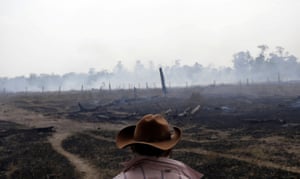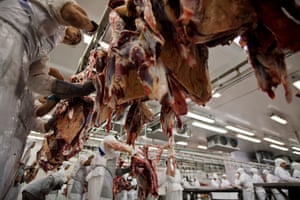New evidence appears to connect JBS, the world’s biggest meat company, to cattle supplied from a farm in the Brazilian Amazon which is under sanction for illegal deforestation.
This is the fifth time in a year that allegations have surfaced connecting the company to Amazon farmers linked with illegal deforestation.
Brazilian beef companies have repeatedly claimed that the biggest challenge to keeping deforestation out of their supply chains is the “indirect suppliers” – farms where cattle are birthed, or which sell to farms where cattle are fattened, which then sell on to other farms or to slaughterhouses. JBS and other major beef firms Minerva and Marfrig all say that although they closely monitor their direct suppliers – the farms that supply slaughterhouses directly – they cannot be sure that there is no deforestation further up the supply chain because they cannot monitor indirect suppliers.
But a joint investigation by Reporter Brasil, the Bureau of Investigative Journalism and the Guardian has uncovered photographs taken by a JBS truck driver last summer which appear to show him transporting cattle from a farm with land under embargo after a deforestation fine, to a “clean” farm which then sold cattle on to JBS. These appear to indicate that JBS is in contact with at least one indirect supplier who has been sanctioned for deforestation.
Whilst JBS has disputed the allegations, the evidence raises serious questions about JBS’s review of its own complex supply chain, at a time when the Brazilian government is being taken to task by international investors over rising deforestation and fires.
The company has already been alleged to have been buying cattle from indirect suppliers linked to environmental offences, deforestation and other crimes in the Amazon four times in just over a year in investigations by the Guardian, the Bureau of Investigative Journalism and Reporter Brasil, and Greenpeace and Amnesty International.
This time, the apparent link between an indirect supplier and JBS was inadvertently revealed by one of its own employees. In July last year, a truck driver took photographs of himself in his JBS uniform, and of his JBS truck, by a sign marked “Fazenda Estrela do Aripuana – 15km” at the southern end of the Amazon rainforest. Fazenda Estrela do Aripuana is a farm near the town of Aripuana, in the north-west of Mato Grosso state, operated by Ronaldo Venceslau Rodrigues da Cunha. His company, according to its website, currently breeds and fattens 102,000 cattle across 16 sites spanning some 72,000 hectares of pasture.
Da Cunha was fined R2.2m (GBP340,000) in 2012 for deforestation of rainforest on land at Aripuana. Records published by Brazil’s environment agency Ibama show 1,455 hectares of land placed under an official embargo – which prohibits cattle grazing – as a result of the deforestation. Embargoes are imposed for environmental violations and serve both as a punishment and protective measure to allow land to recover.
The investigation also found that the Aripuana farm was ravaged by multiple forest fires between 2018 and 2019 by cross-referencing datasets with maps showing the farm’s boundaries. Da Cunha was asked to comment but did not respond.
According to the truck driver’s Facebook posts at the time, he and other drivers were collecting cattle for JBS from the Aripuana farm and trucking them to a second farm run by Da Cunha, Fazenda Estrela do Sangue, just 300km south.

The Sangue farm has not been subject to embargoes so on paper would be seen as a “clean” supplier under JBS’s sourcing protocols.
Although the driver’s Facebook posts detail just one journey between the two farms, cattle are regularly transported from the Aripuana farm to Sangue.
Cattle movement records show that from June 2018 to August 2019, at least 7,000 animals were dispatched from the first farm to the second. Separate records reveal Sangue farm sent some 7,000 cattle to JBS abattoirs in Juina and Juara in Mato Grosso between November 2018 and November 2019.
Further posts by the driver appear to show him trucking cattle between different farms, rather than from farms to an abattoir. These routes between multiple farms as well as abattoirs have been described as “three-legged journeys” by JBS executives in interviews, and appear to be standard operating procedure for the company.
Although government data appears to show the farm identified in the travel documents and by the driver is under embargo, JBS disputes this. When the Guardian asked for clarification of the complex land registrations for Estrela do Aripuana, and the specifics of the cattle collections, JBS stated: “Our system cross references the best available information based on the CAR [rural land registration] map of the property, along with its geographic coordinates, against Ibama [national environmental agency] data. In this particular instance, the collection farm was not shown to be within any embargoed area. We constantly review how our system protocols interact with most up-to-date data available and are determined to enforce our strict company policies as have been identified to you.”
They added: “JBS is working closely with national and local government departments to develop solutions and system improvements around supply chain traceability and best agricultural practice to eradicate deforestation. The interests of all stakeholders are aligned on this topic.”
The company has been working for some time on improving its monitoring systems, and has just brought a new system into use.
“As you know the ‘theoretical index’ of livestock productivity was implemented on 1 July 2020 and is expected to make a significant impact in the reduction of cattle laundering. With new tools such as this, and the active development of other initiatives we are collaborating on with our stakeholders, we are working towards a completely transparent supply chain.”

JBS said its “theoretical index” has “already identified cases which are under investigation”. It is also working on a “green” version of cattle movement records with Brazil’s agriculture ministry that would show the environmental status of supplying farms. These would be automatically cross-referenced with lists of embargoed farms. Last year the company said it had been discussing this plan with the ministry since 2014.
“JBS’s direct suppliers would be able to verify in a very simple and cost-free way the environmental status of the company’s indirect suppliers,” it said. “Tracing of the whole meat supply chain, although a complex task, could be achieved in the medium term.”
Exports of Brazilian beef by the country’s three meat giants – JBS, Minerva and Marfrig – have risen significantly over the last three years, and are found in British and European supermarkets.
“All over Europe there is a cattle tracing system so that people know where calves are born and they can be traced through their lives,” said British MP Angus MacNeil. “Brazil needs to clean up its act with regards to cattle traceability or surely nations will have to act in the face of such potential flagrant violations.”